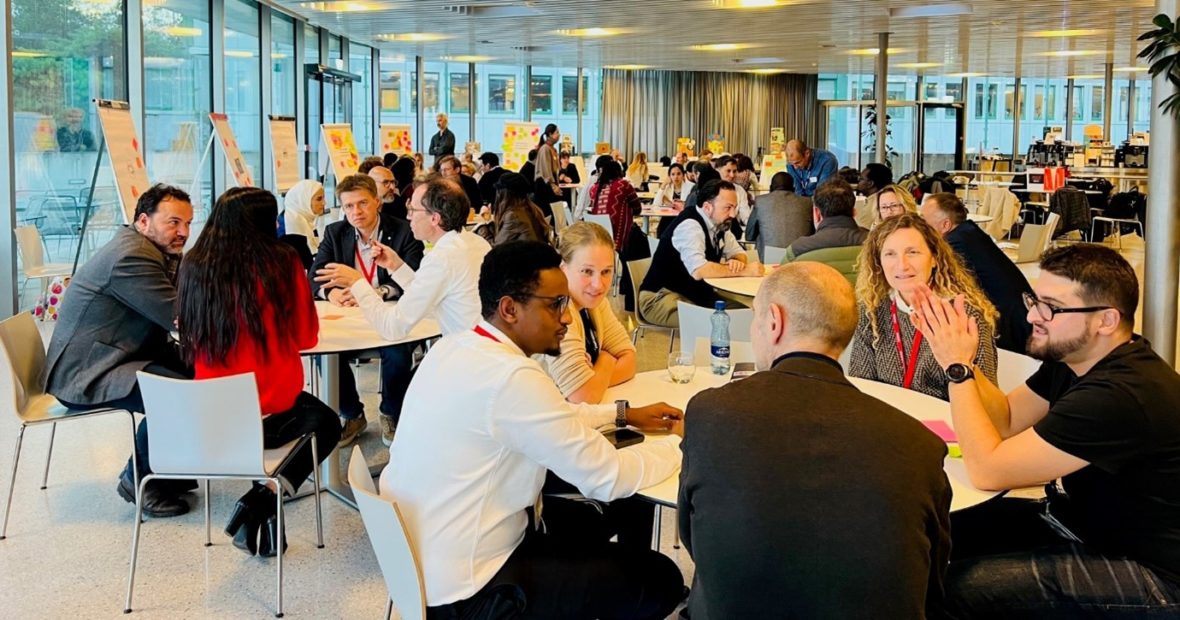We can’t predict the future. But we can be better prepared for what the future will bring.
The ICRC spends a lot of time responding to crises – armed conflict, climate shocks, health emergencies and natural disasters. But how is the organization anticipating future risks and opportunities?
In August 2021 the ICRC launched the Strategic Foresight Initiative – a pilot project led by the Innovation Team aimed at building foresight capacity and facilitating future thinking.
The goal was to embed foresight as a system of collective thinking within the ICRC, enable better strategic decision-making, increase preparedness, and create a future-ready, alert and adaptable organization.
So what exactly is strategic foresight?
It’s a participatory analytical process that walks you through what is known to give an indication of what is probable – and give direction towards what is possible.
“Strategic foresight is a tool that not only aims to make the ICRC more anticipatory and less able to be surprised by circumstances, but also more inclusive and transparent to staff about how the ICRC is preparing for the future,” says ICRC Innovation & Foresight Adviser Melissa Kiehl.
Foresight can provide multiple benefits: it can help communities navigate change and uncertainty; it can make long-range planning more resilient and agile; and it can foster cross-departmental engagement, allowing for more inclusive and equitable outcomes.
The initiative, which ran throughout 2022, saw more than 1,700 ICRC staff participate in strategic foresight training sessions and workshops on themes such as horizon scanning and trends.
A Strategic Foresight Forum was set up, comprised of 55 staff from 49 delegations and headquarters. This group benefited from five days of individual training in foresight methodology and tools, plus group sessions over the year.
No time to wait
For some fields like communication, foresight thinking is not an option: it’s essential practice.
“We are already having these conversations,” says David Pupovac, an ICRC data and analytics manager.
“All the content creators in Geneva and around the world are constantly having to think about the future and what might change in the short term, let alone the long term. For example, how will the ICRC position itself in the metaverse. Will we have an avatar? If so, what will it look like?
“For us, strategic foresight is perhaps much more relevant than for other teams because the pace of change is much faster than in other fields. The next gamechanger in the information space is probably already out there. We are just not aware of it yet.”
Another Strategic Foresight Forum participant is Anna Maria Liwak, an environment and climate change specialist, based in Geneva. Her field also requires future thinking.
“The ICRC is already working in complex environments, and we will face more challenges in the future, including the effects of climate change on our activities and the people we help. We must think forward and adapt, otherwise we will end up not being relevant or fit for the future,” she says.
“Because of what I do, I’m always trying to be future-oriented and think about long-term planning, which is not the default approach for everyone. We need this to change if we want to be effective and sustainable. Therefore, we have to empower colleagues and give them the tools to make it easier for them to apply strategic foresight.”
What happens next?
The goal now is to build a community of practitioners and raise awareness of the benefits of foresight thinking across the ICRC. A new Strategic Foresight Forum cohort will be recruited next year – more than 400 staff applied first time around.
The ultimate aim is to anchor strategic foresight within the culture of the ICRC. A key challenge, though, will be how to encourage others in the ICRC – staff and managers – of the value of futures thinking for strategy.
“There has to be a whole cultural shift in the way we analyse and deconstruct problems and formalize solutions,” says Jamal Khan, head of the ICRC’s Pakistan delegation and another Strategic Foresight Forum participant.
“This initiative is a small step in a long process, but at least we’ve started it. It’s something we need to learn and build together. This is the future.”
Foresight & Techplomacy
In July 2022, the ICRC underwent a leadership transformation, with six new directors appointed to lead newly configured departments.
As part of that transition, a Foresight & Techplomacy (FORTEC) pole was established at the Executive Office of the Director-General of which the innovation team became part.
The FORTEC team was established to better leverage foresight for impact and innovation through anticipatory thinking and a more strategic reading of global transformations. Working towards the preservation and promotion of ICRC’s key strengths in cyber space, the FORTEC team aims to ensure that the political dimensions of digital transformation are well connected and managed across the institution.
“I deeply believe the best decisions come from collective intelligence,” says ICRC Special Envoy for Foresight and Techplomacy Balthasar Staehelin. “There is a lot of foresight in the different teams and units, but we sometimes struggle to connect it.”
“We need to strengthen our collective capacity to anticipate the future – to identify obstacles and opportunities ahead of time and start to address them.”
As part of that remit, the ICRC Innovation team will continue to deliver the Strategic Foresight Initiative with expanded foresight training, collaborative strategic thinking and an eye always on the future.

